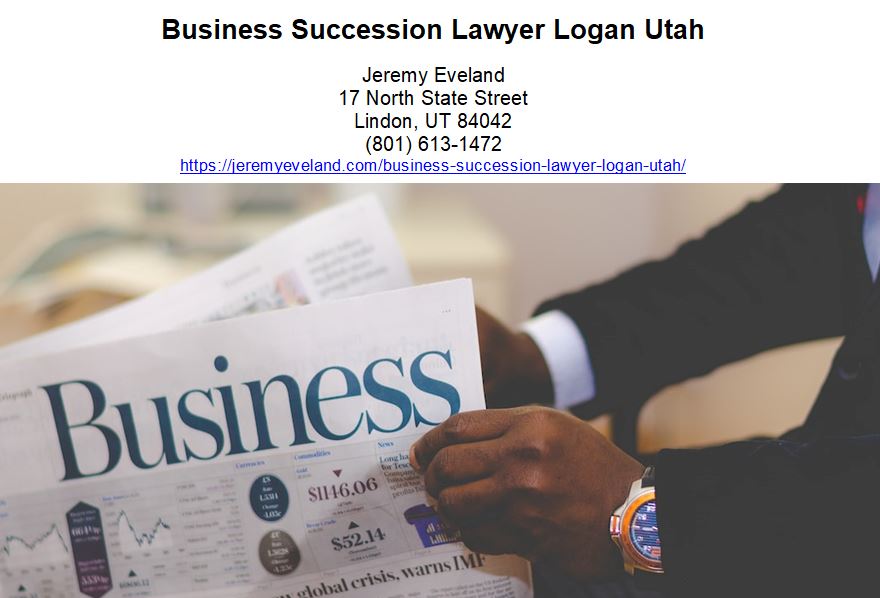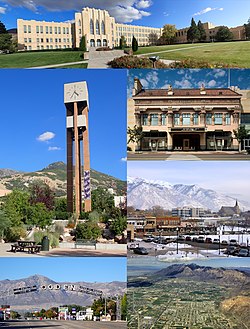Business Succession Lawyer Logan Utah
Business succession planning is an important part of the overall financial planning process for many business owners, especially those who own family businesses. A business succession plan is a document that outlines the steps to be taken in order to transfer ownership of a business to the next generation. It also provides a framework for addressing the financial needs of the business owners and their families, as well as the succession of the business itself.
Business succession planning should include an analysis of the business’s current value, and an assessment of the business owners’ financial needs, including estate taxes and other liabilities. Business owners should also consider potential candidates for ownership, including family members, key employees, and outside parties. Many business owners opt for a buy-sell agreement, which is a legal agreement between business owners and potential buyers to purchase the business interest in the event of the death or disability of a business owner.
In addition to buy-sell agreements, small business owners should also consider financial life insurance as a part of their succession planning. A life insurance policy can be used to fund the purchase of a business interest from a deceased or disabled business owner. The proceeds from such a life insurance policy can help to ensure that the business continues to thrive, and that the next generation of the family business is able to take over.
For larger businesses, succession planning may also involve the use of member firms or key employees to ensure continuity of operations. It is important that the business owner carefully assess potential candidates for ownership, as well as the potential impact of their selection on the business’s value.
Business succession planning is an important part of the financial planning process for many business owners, especially those who own family businesses. By creating a comprehensive succession plan, business owners can ensure that their businesses are able to continue to thrive for generations to come. Furthermore, by implementing buy/sell agreements and life insurance policies, business owners can ensure that the financial needs of their families and the business itself are taken care of in the event of their death or disability.
Business Succession Planning
Business succession planning is the process in which long-term needs are identified and addressed. The main concern in succession planning is in providing for the continuation of business operations in the event that the owner or manager retires or suddenly becomes incapacitated or deceased. This can occur by several means, such as transferring leadership to the following generation of family members or by naming a specific person to become the next owner. It is highly advantageous to have a business succession plan. Such a plan can create several benefits for the business, including tax breaks and no gaps in business operations. The plan will be formally recorded in a document, which is usually drafted by an attorney. A business succession plan is similar to a contract in that it has binding effect on the parties who sign the document and consent to the plan. Therefore, the main advantage of having a succession plan is that the organization will be much better prepared to handle any unforeseen circumstances in the future. A well thought out succession plan will be both very broad in scope and specific in detailed instruction. It should include many provisions to address other concerns besides the issue of who will take over ownership.
A business succession plan should include:
• Approximate dates or time frames when succession will begin. For example, the projected date of the owner’s retirement. Instructions should also be composed for steps to take as the date approaches.
• Provisions for what should occur in case of the owner’s unexpected incapacitation, such as in the event of severe illness or death. A replacement should be named in these provisions, and you should state how long their responsibilities will last (i.e., permanent or temporary).
• Identification of who will be the next successor or a guideline for how election should occur, and instructions to ensure a smooth transition.
• A strategic plan for the business after the succession has taken place. This should include any new revisions to current policies and management structures.
As you might expect, there are many legal matters to be addressed when creating a succession plan. Some common issues that arise in connection with business succession include:
• Choice of successor: If the succession plan does not clearly name a successor, it can lead to disputes, especially amongst family members who may be inheriting the business. Be sure to state exactly who will take charge.
• Property distribution: If there is any property in the previous owner’s name, this will need to be addressed so that the property can be distributed upon or during transition.
• Type of business form: Every type of business has different requirements regarding succession. For example, if the business is a corporation, the previous owner’s name must be removed from the articles of incorporation and replaced with that of the successor’s name. On the other hand, partnerships will usually dissolve upon the death of a partner, and it must be re-formed unless specific provisions are made in a contract.
• Tax issues: Any outstanding taxes, debts, or unfinished business must be resolved. Also, if the owner has died, there may be issues with death taxes.
• Benefits: You should ask whether the business will continue to provide benefits even after the owner has retired. For example, health care, life insurance, and retirement pay must be addressed.
• Employment contracts: If there are any ongoing employment contracts, these must be honored so as to avoid an employment law disputes. For example, if there is going to be a change in management structure, it must take into account any provisions contained in the employees’ contracts.
Picking the Successor
When creating the business succession plan, it is crucial that the person that succeeds the current owner is able to continue the company successfully. Without this ability, many individuals may be crossed off the list. Otherwise, it is just easier to sell the organization to someone that the owner has not invested interest in, and the continued transactions and revenue mean nothing personal. One of the primary reasons to have a business succession plan is to ensure the company continues functioning after the owner either enters retirement or dies. For the successor to be a family member, he or she must be fully prepared to work hard and invest time and energy into the business. Many owners of a business have multiple family members or assistants that could take his or her place. It is important to assess both the strengths and weaknesses of each individual so he or she is able to choose the person best suited for the position. There could be resentment and negative emotions that affect the arrangement with other members of the family, and this must be taken into account along with keeping other relationships from becoming complicated such as a spouse or the manager of the business who may have assumed he or she would take on the ownership or full run of the company.
Finalizing the Process
While some may sell the company before retiring or death, it is still important to determine the value of the business before the plan is finalized. This means an appraisal and documentation with the successor’s name and information. Additional items may need to be purchased such as life insurance, liability coverage and various files with the transfer of ownership if the owner is ready to conclude the proceedings. The current owner may also be provided monetary compensation for his or her interest or a monthly stipend based on the profits of the company. These matters are determined by the paperwork and possession of the business. The transfer may be possible through a cross-purchase agreement where each party has a policy on the partners in the business. Each person is both owner and beneficiary simultaneously. This permits a buyout of shares or interest when one partner dies if necessary. An entity purchase occurs with the policy being both beneficiary and owner. Then the shares are transferred to the company upon the death of one person. Succession plans are commonly associated with retirement; however, they serve an important function earlier in the business lifespan: If anything unexpected happens to you or a co-owner, a succession plan can help reduce headaches, drama, and monetary loss. As the complexity of the business and the number of people impacted by the exit grows, so does the need for a well-written succession plan.
You should consider creating successions plan if you:
• Have complex processes: How will your employees and successor know how to operate the business once you exit? How will you duplicate your subject matter expertise?
• Employ more than just yourself: Who will step in to lead employees, administer human resources (HR) and payroll, and choose a successor and leadership structure?
• Have repeat clients and ongoing contracts: Where will clients go after your exit, and who will maintain relationships and deliver on long-term contracts?
• Have a successor in mind: How did you arrive at this decision, and are they aware and willing to take ownership?
When to Create a Small Business Succession Plan
Every business needs a succession plan to ensure that operations continue, and clients don’t experience a disruption in service. If you don’t already have a succession plan in place for your small business, this is something you should put together as soon as possible. While you may not plan to leave your business, unplanned exits do happen. In general, the closer a business owner gets to retirement age, the more urgent the need for a plan. Business owners should write a succession plan when a transfer of ownership is in sight, including when they intend to list their business for sale, retire, or transfer ownership of the business. This will ensure the business operates smoothly throughout the transition. There are several scenarios in which a business can change ownership. The type of succession plan you create may depend on a specific scenario. You may also wish to create a succession plan that addresses the unexpected, such as illness, accident, or death, in which case you should consider whether to include more than one potential successor.
Selling Your Business to a Co-owner
If you founded your business with a partner or partners, you may be considering your co-owners as potential successors. Many partnerships draft a mutual agreement that, in the event of one owner’s untimely death or disability, the remaining owners will agree to purchase their business interests from their next of kin. This type of agreement can help ease the burden of an unexpected transition—for the business and family members alike. A spouse might be interested in keeping their shares but may not have the time investment or experience to help it blossom. A buy-sell agreement ensures they’re given fair compensation, and allows the remaining co-owners to maintain control of the business.
Passing Your Business Onto an Heir
Choosing an heir as your successor is a popular option for business owners, especially those with children or family members working in their organization. It is regarded as an attractive option for providing for your family by handing them the reins to a successful, fully operational enterprise. Passing your business on to an heir is not without its complications. Some steps you can take to pass your business onto an heir smoothly are:
• Determine who will take over: This is an easy decision if you already have a single-family member involved in the business but gets more complicated when multiple family members are interested in taking over.
• Provide clear instructions: Include instructions on who will take over and how other heirs will be compensated.
• Consider a buy-sell agreement: Many succession plans include a buy-sell agreement that allows heirs that are not active in the business to sell their shares to those who are.
• Determine future leadership structure: In businesses where many heirs are involved, and only one will take over, you can simplify future discussions by providing clear instructions on how the structure should look moving forward.
Selling Your Business to a Key Employee
When you don’t have a co-owner or family member to entrust with your business, a key employee might be the right successor. Consider employees who are experienced, business-savvy, and respected by your staff, which can ease the transition. Your org chart can help with this. If you’re concerned about maintaining quality after your departure, a key employee is generally more reliable than an outside buyer. Just like selling to a co-owner, a key employee succession plan requires a buy-sell agreement. Your employee will agree to purchase your business at a predetermined retirement date, or in the event of death, disability, or other circumstance that renders you unable to manage the business.
Selling Your Business to an Outside Party
When there isn’t an obvious successor to take over, business owners may look to the community: Is there another entrepreneur, or even a competitor, that would purchase your business? To ensure that the business is sold for the proper amount, you will want to calculate the business value properly, and that the valuation is updated frequently. This is easier for some types of businesses than others. If you own a more turnkey operation, like a restaurant with a good general manager, your task is simply to demonstrate that it’s a good investment. They won’t have to get their hands dirty unless they want to and will ideally still have time to focus on their other business interests. Meanwhile, if you own a real estate company that’s branded under your own name, selling could potentially be more challenging. Buyers will recognize the need to rebrand and remarket and, as a result, may not be willing to pay full price. Instead, you should prepare your business for sale well in advance; hire and train a great general manager, formalize your operating procedures, and get all your finances in check. Make your business as stable and turnkey as possible, so it’s more attractive and valuable to outside buyers.
Selling Your Shares Back to the Company
The fifth option is available to businesses with multiple owners. An “entity purchase plan” or a “stock redemption plan” is an arrangement where the business purchases life insurance on each of the co-owners. When one owner dies, the business uses the life insurance proceeds to purchase the business interest from the deceased owner’s estate, thus giving each surviving owners a larger share of the business.
Reasons to Hire a Business Succession Attorney
• Decisions during the Idea Stage: Even before you officially open your doors for business, you have several decisions to make that will affect your daily operations going forward. What will you call your company? Is the name you have in mind available? What is your marketing tag line? Can you use that without encountering any problems? Where will your business be located? Are there any zoning issues of which you need to be aware? These are just a few examples of decisions that need to be made before you even start doing what it is you want to do. These decisions will be a lot easier to make with the help of a business attorney.
• Startup Protocols and Legal Requirements: Another early decision you’re going to have to make involves the specific type of business entity you want to initiate. You need to do so for several reasons, not the least of which is that most types of business entities require some sort of registration and all businesses will need to register and obtain a business license from the local municipalities in which they operate. In addition, you may need to provide public notice of the intention of starting a business entity, which could involve publishing that notice in a newspaper for four weeks. You need to do this right or you could face other problems, which is another reason why hiring a lawyer for your business startup is a wise decision.
• Banking Questions: If you’re going to start a business, you’re also going to need to open a bank account or perhaps multiple bank accounts. You may also need to apply for credit in the forms of credit cards and/or lines of credit if attainable. It’s highly advisable for a plethora of reasons to keep all of your business finances completely separate from your personal situation, as it’ll be much easier to organize those separate forms of finances come tax time or should any other questions arise. A small business attorney can help you choose the proper bank and the type of account or accounts you should look to open so you don’t wind up scrambling after you begin your core mission.
• Tax Questions: Since the founding of our country, a common quote that people tend to repeat in several contexts is, “Nothing is certain except for death and taxes.” What is not debatable is that your business will be taxed in one way or another, and you need a lawyer for your business startup to make sure that you’re both in compliance with local, state and federal tax codes and so that you’re not unnecessarily facing double taxes. Tax questions should be answered before you get started so you know what to generally expect in this regard, and from there you should work with a tax accountant for your specific tax questions.
• Insurance Questions: One of the issues that you’ll begin to hear and think more about as you get ready to start your business involves liability. You are responsible for the product or service you provide to your clients or customers, and you want to make sure that you’re protected from personal liability should something go wrong. You may also need to comply with regulations that require some sort of liability insurance coverage, but choosing the proper coverage and understanding the nature of that coverage are involved tasks that need to be done right. A small business attorney can help guide your business towards the coverage you need while simultaneously helping you minimize the chance for unexpected and unpleasant surprises down the road.
• Debt Management: For most Americans, debt is simply a part of life. For the majority of small business owners, debt is something that exists even before they open their doors. Debt is real and it doesn’t go away easily, and like anything else, questions, confusion and problems relating to debt can arise that can harm your ability to push your organization forward. The best way to manage debt issues is by way of advice from a business attorney who can explain the legalities involved with it and fight for you if there is a problem.
• Dispute Advocacy: It’s common for any business to encounter disputes of one type or another. It’s also unfortunately common for a startup business to wind up dealing with a problem with a vendor or some larger, more established entity. Regardless, owners need a small business attorney at the ready to fight for their company when such situations arise. An attorney who isn’t going to hesitate to advocate zealously for clients can level the playing field and even help resolve issues before they become much larger problems. In some cases, even mentioning that you have an attorney representing you could help avoid those problems altogether.
Logan Utah Business Succession Lawyer Consultation
When you need legal help from an attorney to help with a business succession, call Jeremy D. Eveland, MBA, JD (801) 613-1472 for a consultation.
Jeremy Eveland
17 North State Street
Lindon UT 84042
(801) 613-1472
Related Posts
Business Succession Lawyer Salt Lake City Utah
The Utah Uniform Partnership Act
The 10 Essential Elements of Business Succession Planning
Business Succession Lawyer Taylorsville Utah
Business Succession Lawyer South Jordan Utah
Business Succession Lawyer Lehi Utah
Business Succession Lawyer Millcreek Utah
Business Lawyer Salt Lake City Utah
Business Transaction Lawyer Salt Lake City Utah
Business Succession Lawyer Herriman Utah
What Are The Advantages Of Hiring A Business Lawyer?
Business Succession Lawyer Logan Utah
Logan, Utah
|
Logan, Utah
|
|
|---|---|
|
City
|
|

Downtown Logan, with courthouse
|
|
| Motto:
“United in Service”
|
|

Location in Cache County and the state of Utah
|
|
| Coordinates: 41°44′16″N 111°49′51″WCoordinates: 41°44′16″N 111°49′51″W | |
| Country | |
| State | |
| County | Cache |
| Founded | 1859 |
| Incorporated | January 17, 1866 |
| Named for | Ephraim Logan[1] |
| Government
|
|
| • Type | Mayor-council |
| • Mayor | Holly H. Daines[2] |
| Area
|
|
| • Total | 18.43 sq mi (47.74 km2) |
| • Land | 17.84 sq mi (46.22 km2) |
| • Water | 0.59 sq mi (1.52 km2) |
| Elevation | 4,534 ft (1,382 m) |
| Population | |
| • Total | 52,778 |
| • Density | 2,957.5/sq mi (1,141.89/km2) |
| Time zone | UTC−7 (Mountain (MST)) |
| • Summer (DST) | UTC−6 (MDT) |
| ZIP Codes |
84321-84323, 84341
|
| Area code | 435 |
| FIPS code | 49-45860 |
| GNIS ID | 1442849[3] |
| Website | www |
Logan is a city in Cache County, Utah, United States. The 2020 census recorded the population was 52,778.[4][5] Logan is the county seat of Cache County[6] and the principal city of the Logan metropolitan area, which includes Cache County and Franklin County, Idaho. The Logan metropolitan area contained 125,442 people as of the 2010 census[7][8] and was declared by Morgan Quitno in 2005 and 2007 to be the safest in the United States in those years.[9] Logan also is the location of the main campus of Utah State University.
[geocentric_weather id=”0ac5dacd-0f02-41f9-80e6-70e150b5980d”]
[geocentric_about id=”0ac5dacd-0f02-41f9-80e6-70e150b5980d”]
[geocentric_neighborhoods id=”0ac5dacd-0f02-41f9-80e6-70e150b5980d”]
[geocentric_thingstodo id=”0ac5dacd-0f02-41f9-80e6-70e150b5980d”]
[geocentric_busstops id=”0ac5dacd-0f02-41f9-80e6-70e150b5980d”]
[geocentric_mapembed id=”0ac5dacd-0f02-41f9-80e6-70e150b5980d”]
[geocentric_drivingdirections id=”0ac5dacd-0f02-41f9-80e6-70e150b5980d”]
[geocentric_reviews id=”0ac5dacd-0f02-41f9-80e6-70e150b5980d”]






























